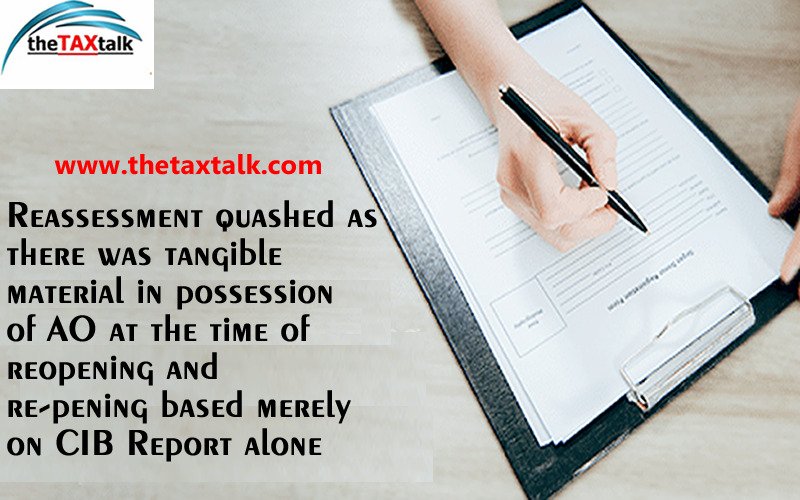![]()
Reassessment quashed as there was tangible material in possession of AO at the time of reopening and re-pening based merely on CIB Report alone
Short Overview Even though reopening of assessment was made after expiry of four years from the end of the relevant assessment, however, there was no original return of income filed by assessee and consequent assessment, hence, it was not necessary for AO to show that there was any failure to disclose fully or truly all material facts necessary for assessment in terms of proviso to section 147, however, AO had merely gone by the CIB Report and was not even in possession of sale deed and the exact specifics of transaction at the time of recording of reasons and, therefore, proceedings were vitiated for want of tangible material in possession of AO and lack of reason to believe which was more in the realm of suspicion, rather than formation of opinion that income had escaped assessment.
AO received information from CIB as to assessee having sold immovable property for a consideration of Rs. 7 lakhs which was valued at Rs. 7.17 lakhs for the purposes of charging stamp duty. Accordingly, AO reopened assessment after expiry of four years from the end of relevant assessment year. Assessee took plea of proviso to section 147.
It is held that Even though reopening was made after expiry of four years from the end of the relevant assessment, however, there was no original return of income filed by assessee and consequent assessment, hence it was not necessary for AO to show that there was any failure to disclose fully or truly all material facts necessary for assessment in terms of proviso to section 147, however, AO had merely gone by the CIB report and was not even in possession of sale deed and the exact specifics of transaction at the time of recording of reasons and, therefore, proceedings were vitiated for want of tangible material in possession of AO and lack of reason to believe which was more in the realm of suspicion, rather than formation of opinion that income had escaped assessment.
Decision: In assessee s favour.
Followed: Balaji Health Care (P) Ltd. v. ITO (2019) 14 ITR (Trib) 570 (JP) [ITA Nos. 566 and 567/JP/2018 vide Order dated 30-1-2019
IN THE ITAT, JAIPUR “A” BENCH
SANDEEP GOSAIN, J.M. & VIKRAM SINGH YADAV, A.M.
Shujaat Ali Khan v. ITO
ITA No. 170/JP/2019
A.Y. 2008-09
5 January, 2021
Assessee by: Vinod Kumar Gupta, Chartered Accountant
Department by: Monisha Chaudhory, Additional Commissioner
ORDER

